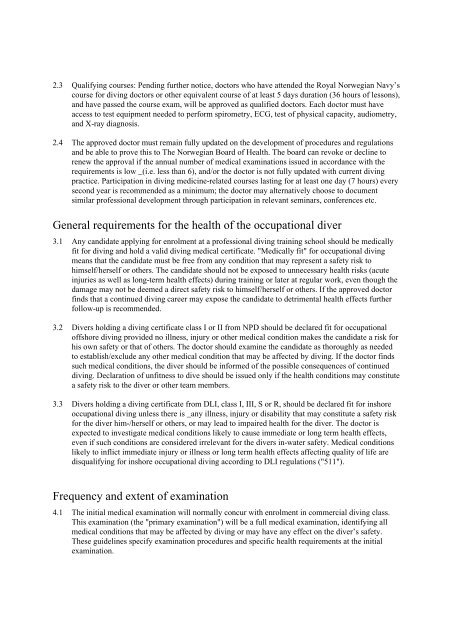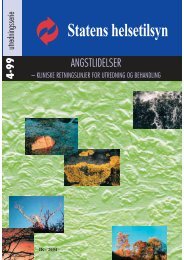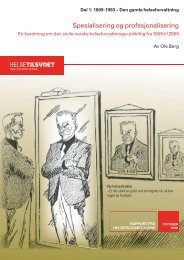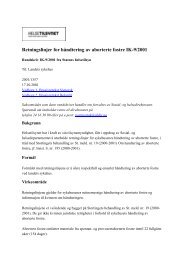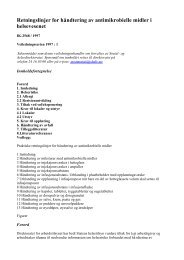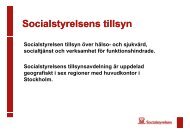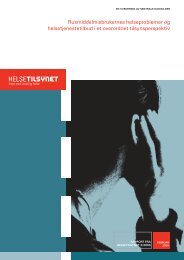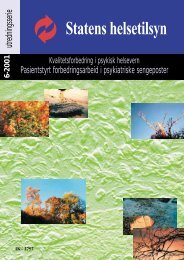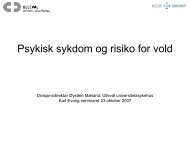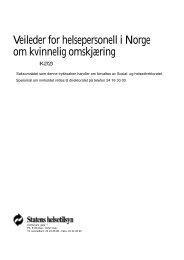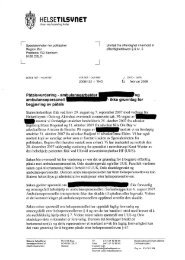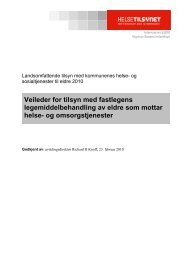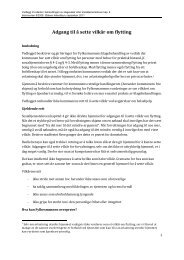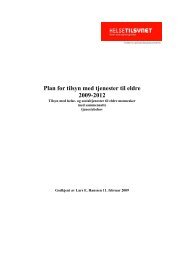Norwegian guidelines for medical examination of occupational divers
Norwegian guidelines for medical examination of occupational divers
Norwegian guidelines for medical examination of occupational divers
You also want an ePaper? Increase the reach of your titles
YUMPU automatically turns print PDFs into web optimized ePapers that Google loves.
2.3 Qualifying courses: Pending further notice, doctors who have attended the Royal <strong>Norwegian</strong> Navy’s<br />
course <strong>for</strong> diving doctors or other equivalent course <strong>of</strong> at least 5 days duration (36 hours <strong>of</strong> lessons),<br />
and have passed the course exam, will be approved as qualified doctors. Each doctor must have<br />
access to test equipment needed to per<strong>for</strong>m spirometry, ECG, test <strong>of</strong> physical capacity, audiometry,<br />
and X-ray diagnosis.<br />
2.4 The approved doctor must remain fully updated on the development <strong>of</strong> procedures and regulations<br />
and be able to prove this to The <strong>Norwegian</strong> Board <strong>of</strong> Health. The board can revoke or decline to<br />
renew the approval if the annual number <strong>of</strong> <strong>medical</strong> <strong>examination</strong>s issued in accordance with the<br />
requirements is low _(i.e. less than 6), and/or the doctor is not fully updated with current diving<br />
practice. Participation in diving medicine-related courses lasting <strong>for</strong> at least one day (7 hours) every<br />
second year is recommended as a minimum; the doctor may alternatively choose to document<br />
similar pr<strong>of</strong>essional development through participation in relevant seminars, conferences etc.<br />
General requirements <strong>for</strong> the health <strong>of</strong> the <strong>occupational</strong> diver<br />
3.1 Any candidate applying <strong>for</strong> enrolment at a pr<strong>of</strong>essional diving training school should be <strong>medical</strong>ly<br />
fit <strong>for</strong> diving and hold a valid diving <strong>medical</strong> certificate. "Medically fit" <strong>for</strong> <strong>occupational</strong> diving<br />
means that the candidate must be free from any condition that may represent a safety risk to<br />
himself/herself or others. The candidate should not be exposed to unnecessary health risks (acute<br />
injuries as well as long-term health effects) during training or later at regular work, even though the<br />
damage may not be deemed a direct safety risk to himself/herself or others. If the approved doctor<br />
finds that a continued diving career may expose the candidate to detrimental health effects further<br />
follow-up is recommended.<br />
3.2 Divers holding a diving certificate class I or II from NPD should be declared fit <strong>for</strong> <strong>occupational</strong><br />
<strong>of</strong>fshore diving provided no illness, injury or other <strong>medical</strong> condition makes the candidate a risk <strong>for</strong><br />
his own safety or that <strong>of</strong> others. The doctor should examine the candidate as thoroughly as needed<br />
to establish/exclude any other <strong>medical</strong> condition that may be affected by diving. If the doctor finds<br />
such <strong>medical</strong> conditions, the diver should be in<strong>for</strong>med <strong>of</strong> the possible consequences <strong>of</strong> continued<br />
diving. Declaration <strong>of</strong> unfitness to dive should be issued only if the health conditions may constitute<br />
a safety risk to the diver or other team members.<br />
3.3 Divers holding a diving certificate from DLI, class I, III, S or R, should be declared fit <strong>for</strong> inshore<br />
<strong>occupational</strong> diving unless there is _any illness, injury or disability that may constitute a safety risk<br />
<strong>for</strong> the diver him-/herself or others, or may lead to impaired health <strong>for</strong> the diver. The doctor is<br />
expected to investigate <strong>medical</strong> conditions likely to cause immediate or long term health effects,<br />
even if such conditions are considered irrelevant <strong>for</strong> the <strong>divers</strong> in-water safety. Medical conditions<br />
likely to inflict immediate injury or illness or long term health effects affecting quality <strong>of</strong> life are<br />
disqualifying <strong>for</strong> inshore <strong>occupational</strong> diving according to DLI regulations ("511").<br />
Frequency and extent <strong>of</strong> <strong>examination</strong><br />
4.1 The initial <strong>medical</strong> <strong>examination</strong> will normally concur with enrolment in commercial diving class.<br />
This <strong>examination</strong> (the "primary <strong>examination</strong>") will be a full <strong>medical</strong> <strong>examination</strong>, identifying all<br />
<strong>medical</strong> conditions that may be affected by diving or may have any effect on the diver’s safety.<br />
These <strong>guidelines</strong> specify <strong>examination</strong> procedures and specific health requirements at the initial<br />
<strong>examination</strong>.


